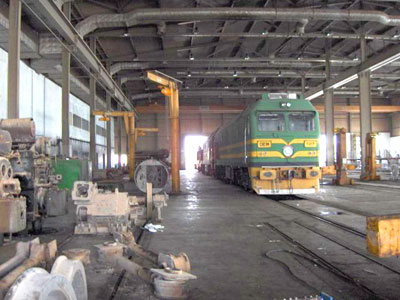A US Army Corps of Engineers press release from August 2006, with photographs of a locomotive depot and a large marshalling yard.

The locomotive is a Thyssen-Henschel/EMD class DEM2500.
Tameem Railway Station Rehab – An Economic Vision for the Future of Kirkuk
By Polli Barnes Keller
Gulf Region North
U.S. Army Corps of EngineersKirkuk, Iraq- Neglected and oppressed during the Saddam era, citizens of Kirkuk are rising to rebuild their city and their country’s economy. Appropriate thereto, Iraq’s oil plays an active role stimulating and directing that economy. With operations back on-line in the local oil fields, other infrastructure preparation for further economic growth is underway.
The rehabilitation of the Tameem Railway Station is one illustration of economic support in progress. The reconstruction and rehabilitation of this facility is part of a vision for the future of the country through the development of basic services and strategic infrastructure. An operating rail system will assist in generating an economic recovery within the region.
Major Craig Guth, P.E. (Professional Engineer), the Kirkuk Provincial Reconstruction Team Engineer of the U.S. Army Corps of Engineers spoke of the railway, “Rebuilding the rail industry is important to the Iraqi economy. After years of neglect of the highways and road network, the construction boom we are seeing today in Kirkuk and the need to transport fuel and oil products by road is straining the transportation system. Rail is a much more efficient alternative and is necessary for Kirkuk’s continued future development.”
Improving the station’s ability to handle increasing freight storages will help fulfill the vision of Iraq’s future in laying the foundation for a growth economy. Added freight capacity and the potential for the long term employment of Iraqis are examples of this vision coming to realization.
Guth met with the Directorate General for the railroad, Mr. Shakir Mahoud, to discuss the new railway station. Mahoud explained that during Saddam’s era there was a plan to expand and develop the railroads, but was never ratified. A map and design for connecting the cities of Sulaymaniya, Erbil, Dahuk and Mosul to the railroad network exist, however the task is not easy due to the security situation in the region.
The intent is to rebuild the station to improve efficiency and safety. In the past, operational readiness and safety were aggravated by the lack of pre-war maintenance as well as the post-war looting and damage that led to its disrepair.
Joe Domingo, U.S. Army Corps of Engineers, project engineer said “This station previously was an asset to the Kirkuk Province for importing and exporting commodities, transporting postal cargo service, oil, gas, etc between Northern and Southern Iraq.” Currently, limited service is provided between the Kirkuk and Mosul areas.
Renovations to this facility included the construction of many outer buildings as well as rehabilitation to the existing structures. Also constructed was a direct link to the high voltage grid and installation of the lower floor of the Kirkuk Station.
The U.S. Army Corps of Engineers monitored all quality control activities to ensure the requirements of the contract were followed and construction met all the correct quality standards.
Not only is Kirkuk one of the oldest cities in Iraq, but it is at the center of the Iraqi petroleum industry. It holds great importance both historically as well as economically. By setting the infrastructure in place, Iraq is opening itself to economic prosperity. Prosperity will follow regulated commerce, the security of borders and infrastructure, and openness to legitimate trading partners and neighboring countries.
Source: US Army Corps of Engineers press release.